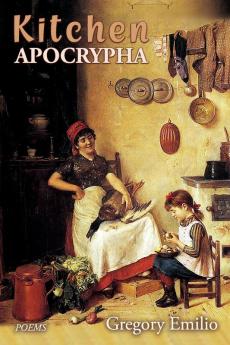English
Paperback
₹1668
(All inclusive*)
Delivery Options
Please enter pincode to check delivery time.
*COD & Shipping Charges may apply on certain items.
Review final details at checkout.
Looking to place a bulk order? SUBMIT DETAILS
About The Book
Description
Author
<p>Gregory Emilio's <em>Kitchen Apocrypha</em> delves richly and sensuously into food as sustenance ritual pleasure and temptation. Drawing upon his food service experiences Emilio contemplates hunger abundance community and solitude through the lens of culinary arts. He navigates meals ranging from sacred family recipes to unassuming roadside diners sprinkling biblical and mythological allusions throughout. Central to his narrative is a deep reverence for food's power to nourish not just the body but the spirit and human connection as well. A finalist for the 2021 Able Muse Book Award <em>Kitchen Apocrypha</em> offers a feast both earthy and sublime.</p><p><br></p><p><strong>PRAISE FOR <em>KITCHEN APOCRYPHA</em>:</strong></p><p><br></p><p>A poet is a professor of the five senses Lorca taught us. Gregory Emilio understands this beautifully. There are prayers here and songs of wonder there is a communal voice and one of solitude. There is elegy and rhapsody. This book is alive. As Emilio writes in one unforgettable page (a cento!): Saint Anthony patron of sausage makers / guide my pen and unkink my tongue. I sing / of a hog theater where hogs performed as men. Gorgeous surprising work.</p><p>- Ilya Kaminsky author of <em>Deaf Republic</em></p><p><br></p><p>The fact that food like sex mediates for us with death provides the guiding metaphor for Gregory Emilio's ingenious book <em>Kitchen Apocrypha</em> which might equally well be titled <em>Kitchen Epiphany</em>. Beginning with a delightful amatory /gustatory rewrite of Yeats's Leda and the Swan (we stumbled out of the bedroom dizzy / and undone rapt and abandoned: hungry) this collection riffs on many foodstuffs spinning through poetic forms as it does so. It examines food service as well as food; it examines anorexia as well as satiety. The elemental fire by which food becomes food is felt also as the Paradise (California) wildfire for the contents and activities of the kitchen Emilio suggests are a way of understanding the world. The true hospitality here is not an industry but a sacred duty to the stranger (to the reader) what the Greeks call xenia. This book is good company.</p><p>- Karl Kirchwey author of <em>Stumbling Blocks</em></p><p><br></p><p>Though Jesus assured us that we could not live by bread alone still manna from heaven manifested itself as bread and the eucharist is a meal of bread and wine. Food is both literal and metaphorical. The poetry in <em>Kitchen Apocrypha</em> about the preparation and consumption and worship of food is a cuisine of muchness and plenty and delicious in the richness of its vocabulary and invention. By the end of the book you may feel stuffed but you'll want more.</p><p>- Mark Jarman author of <em>The Heronry </em></p><p><br></p><p><strong>ABOUT THE AUTHOR:</strong></p><p><br></p><p>Gregory Emilio is a poet and food writer from southern California. His poems and essays have appeared in <em>Best New Poets</em> <em>Gastronomica</em> <em>North American Review</em> <em>[PANK]</em> the <em>Rumpus</em> <em>Tupelo Quarterly</em> and <em>Southern Humanities Review</em>. He holds an MFA from the University of California Riverside and a PhD in English from Georgia State University. A mean home cook and avid cyclist he lives in Atlanta and teaches at Kennesaw State University.</p><p><br></p>
Delivery Options
Please enter pincode to check delivery time.
*COD & Shipping Charges may apply on certain items.
Review final details at checkout.
Details
ISBN 13
9781773491080
Publication Date
-12-04-2024
Pages
-96
Weight
-142 grams
Dimensions
-152x229x5.84 mm








